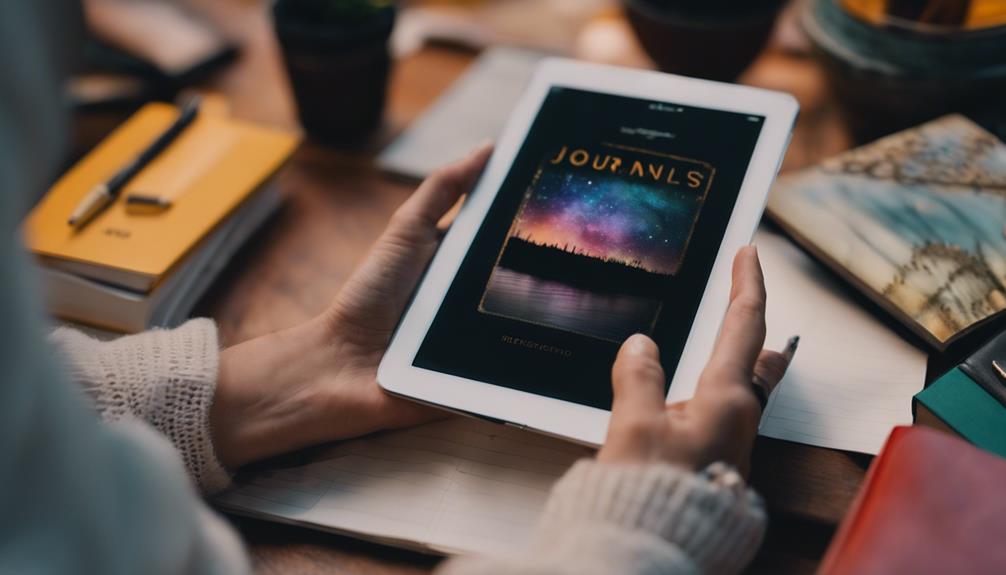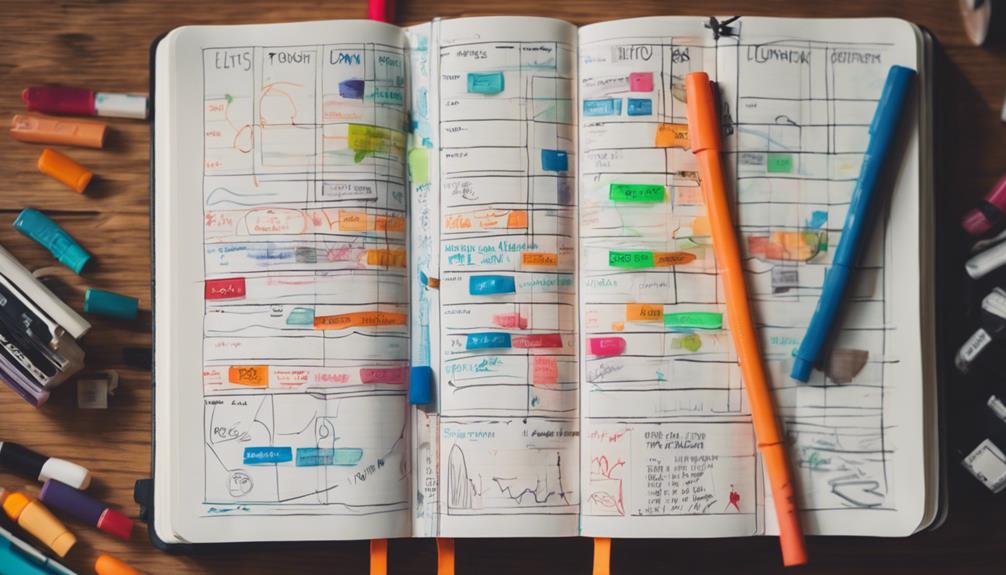Imagine journaling as a compass guiding you through the labyrinth of your thoughts and emotions, helping you navigate the maze of daily life. As you embark on this introspective journey, you'll uncover the power of self-reflection and personal growth.
But where do you begin? What are the essential tips to kickstart your journaling practice and which journals are best suited for beginners? Stay tuned to discover the secrets to journaling success and find your perfect journal companion to embark on this transformative voyage.
Key Takeaways
- Practice journaling for mental and emotional benefits.
- Personalize your journal with tabs, stickers, and colors.
- Establish a routine with Morning Pages and Nightly Gratitude.
- Enhance creativity with art, storytelling, and tracking progress.
Benefits of Journaling

Indulging in the practice of journaling can provide you with numerous benefits that can positively impact your mental and emotional well-being. Journaling is a powerful tool for enhancing your mental health. It allows you to unload your thoughts onto paper, providing a sense of relief and clarity. By expressing your emotions, fears, and joys through journaling, you can better understand your feelings and work through any challenges you may be facing. This act of self-expression is incredibly liberating, giving you a safe space to be completely honest with yourself.
Self-expression through journaling can also help you track patterns in your thoughts and behaviors, leading to improved self-awareness. Recognizing these patterns can aid in identifying triggers for stress or anxiety, allowing you to develop healthier coping mechanisms. Additionally, journaling can serve as a form of therapy, offering a release for pent-up emotions and serving as a refuge during difficult times. Embrace the power of journaling as a valuable tool for nurturing your mental well-being and fostering self-discovery.
Setting Up Your Journal
As you embark on setting up your journal, creating a welcoming and organized space for your thoughts and reflections is key to establishing a consistent and fulfilling journaling practice. Here are some tips to help you get started:
🌊 Discover Endless Fun with Beachcomber Press Puzzle Books! 🌊
Elevate your puzzle game with our captivating collection on Amazon.
Perfect for all ages, our books are packed with unique
challenges that promise hours of entertainment.
Diverse puzzles for every skill level High-quality, engaging content
- Journal organization: Consider using tabs, dividers, or color-coding to keep different sections of your journal organized and easy to navigate.
- Journal decoration: Personalize your journal with stickers, washi tape, or drawings to make it a reflection of your unique personality and style.
- Bullet journaling: Try utilizing bullet points, symbols, and short phrases to jot down your thoughts quickly and efficiently.
- Digital journaling: If you prefer typing over writing by hand, explore digital journaling apps or software to keep your entries secure and easily accessible.
- Inspiration corner: Create a dedicated space in your journal for quotes, images, or prompts that inspire you to write and reflect regularly.
Choosing the Right Journal

When selecting the right journal for your needs, consider factors like size, paper quality, and binding that will enhance your writing experience. Personal preferences play a significant role in choosing the perfect journal. Reflect on whether you prefer a compact size for portability or a larger one for more writing space. Think about the paper quality that suits your journaling styles; some prefer the smoothness of thick paper while others enjoy the texture of recycled materials. Binding is also crucial; spiral bindings allow for easy flipping, while hardcovers offer durability.
Your journal should align with your journaling purpose and style. If you're into artistic journaling, choose a sketchbook or a dotted journal that accommodates drawings and designs. For those focusing on expressive writing, a lined journal might be more suitable. Remember, there's no right or wrong choice—what matters most is that your journal feels like an extension of yourself, encouraging you to write freely and authentically.
Establishing a Routine
To make the most of your journaling practice, establishing a routine can help you stay consistent and reap the full benefits of self-reflection and expression. Here are some tips to help you create a sustainable journaling routine:
- Morning Pages: Start your day with a few pages of stream-of-consciousness writing to clear your mind and set intentions.
- Daily Reflection: Take a few moments each day to reflect on your experiences, emotions, and thoughts.
- Nightly Gratitude: Before bed, jot down things you're grateful for to end the day on a positive note.
- Weekly Check-ins: Set aside time each week to assess your progress, set new goals, and track your personal growth.
- Consistency is Key: Find a time that works best for you, whether it's in the morning, during lunch, or before bed, and make journaling a daily habit.
Establishing a routine won't only enhance your journaling experience but also support your journey towards self-discovery and personal growth.
Journaling Prompts for Beginners

Embrace the journey of self-discovery and personal growth through engaging journaling prompts specifically tailored for beginners. Journaling prompts come in various forms and can spark creativity and deep self-reflection.
To kickstart your journaling practice, consider writing about a positive experience that made you smile recently. Alternatively, jot down a list of things you're grateful for today. These simple exercises can set a positive tone for your journaling sessions.
For more prompt variations, try describing a challenge you overcame and the lessons you learned from it. Another creative idea is to write a letter to your past or future self, expressing hopes, fears, or gratitude. These prompts not only encourage self-reflection but also promote personal growth.
Overcoming Writer's Block
If you find yourself staring at a blank page, feeling stuck and unsure of where to start, there are practical strategies you can employ to overcome writer's block and reignite your creativity. Writer's block is a common hurdle, but with the right approach, you can break through the barrier and get back to journaling.
Here are some tips to help you get past that blank page:
- Try Creative Exercises: Engage in activities like freewriting, mind mapping, or even doodling to get your creative juices flowing.
- Explore Inspiration Sources: Take a walk in nature, listen to music, read a book, or visit an art gallery to find inspiration from the world around you.
- Set Small Goals: Break down your writing tasks into manageable chunks to make the process less overwhelming.
- Change Your Environment: Sometimes a change of scenery can do wonders for your creativity. Try writing in a different place to spark new ideas.
- Take Breaks: Don't be afraid to step away from your journal and come back to it later with a fresh perspective.
Reflecting on Your Entries

When reflecting on your journal entries, consider the emotions and thoughts that surface as you revisit your experiences. Embracing emotion exploration in your reflective practice can lead to a profound self-discovery journey. As you read through your entries, pay attention to the feelings that arise within you. Are there patterns in your emotions? Do certain events trigger specific reactions? Understanding your emotional responses can provide valuable insights into your inner world.
Journaling offers a safe space to delve into the depths of your psyche and unravel the complexities of your thoughts. It allows you to witness your growth, setbacks, and moments of clarity. Each entry is a stepping stone on your self-discovery journey, guiding you towards a deeper understanding of yourself.
As you engage in this process, be gentle with yourself. Embrace vulnerability and authenticity in your reflections. Trust the pages of your journal to hold your unfiltered thoughts and feelings. Through introspection and contemplation, you pave the way for personal growth and transformation. Remember, journaling is a tool for liberation, a pathway to uncovering the true essence of who you are.
Incorporating Creativity
To infuse your journaling practice with a touch of creativity, consider experimenting with different artistic mediums or prompts to spark new perspectives and insights. Here are some ideas to help you unleash your creativity within your journal:
🌊 Discover Endless Fun with Beachcomber Press Puzzle Books! 🌊
Elevate your puzzle game with our captivating collection on Amazon.
Perfect for all ages, our books are packed with unique
challenges that promise hours of entertainment.
Diverse puzzles for every skill level High-quality, engaging content
- Artistic expression: Use watercolors, colored pencils, or markers to add a splash of color to your entries.
- Mindful doodling: Let your pen wander freely on the page, creating intricate patterns and designs that reflect your thoughts and emotions.
- Creative writing: Try writing poetry, short stories, or even dialogues between different parts of yourself to delve deeper into your inner world.
- Visual storytelling: Incorporate photographs, magazine cutouts, or sketches to visually represent your experiences and feelings.
- Collage creation: Collect images, quotes, and textures that resonate with you and arrange them in your journal to create a visual representation of your journey.
Embrace the freedom to express yourself creatively in your journal, allowing your thoughts and emotions to flow uninhibitedly onto the pages.
Tracking Progress and Growth

To effectively track your progress and growth in your journaling journey, consider establishing clear goals and benchmarks to reflect on your personal development. Setting specific objectives can help you measure personal development and self-discovery. Take time to reflect on where you started, where you're now, and where you aim to be. Celebrating achievements, no matter how small, is crucial for maintaining motivation and a positive mindset. Acknowledge your progress, no matter how incremental it may seem, and use setbacks as opportunities for learning and growth.
Tracking your journey allows you to see patterns, identify what works best for you, and understand areas that need improvement. Regularly revisiting your journal entries can provide valuable insights into your emotional, mental, and even spiritual evolution. Embrace the process of self-discovery with an open heart and mind. Remember, your journal is a safe space for reflection and growth, so allow yourself the freedom to explore and learn from your experiences.
Top Journals for Beginners
Exploring the world of journaling as a beginner, you may find that selecting the right journal can greatly enhance your writing experience. When choosing a journal, consider your journaling styles and writing techniques.
Here are some top journals that are perfect for beginners like you:
- Classic Moleskine Notebook: A timeless choice for traditional journaling.
- Leuchtturm1917 Bullet Journal**: Ideal for those interested in bullet journaling and creative organization.
- Promptly Journals: Great for guided journaling with thoughtful prompts to get you started.
- Baron Fig Confidant: Perfect for experimenting with different writing techniques and styles.
- Five Minute Journal**: If you prefer a structured format to quickly jot down thoughts and gratitude.
Each of these journals offers a unique experience to cater to various preferences in journaling. Remember, the best journal is one that resonates with you and inspires you to write consistently.
Happy journaling!
Frequently Asked Questions
How Can Journaling Help Improve Mental Health and Well-Being?
Journaling can boost mental health by helping you express emotions, practice gratitude, and develop coping strategies. Mindful writing provides an emotional release and promotes self-awareness, supporting your well-being and offering a space for growth and reflection.
Is It Better to Journal in the Morning or at Night for Optimal Benefits?
For optimal benefits, consider your energy levels and routine. Morning journaling can boost productivity by setting intentions and clarifying thoughts. Night journaling may aid in reflection and unwinding. Experiment to see what works best for you.
Can Journaling Be Used as a Form of Therapy or Self-Reflection?
Journaling isn't just scribbling; it's like a secret mirror reflecting your thoughts. Through creative expression, you delve into emotional healing and spark personal growth. Dive deep, write your truths, and let mindful reflection guide you.
🌊 Discover Endless Fun with Beachcomber Press Puzzle Books! 🌊
Elevate your puzzle game with our captivating collection on Amazon.
Perfect for all ages, our books are packed with unique
challenges that promise hours of entertainment.
Diverse puzzles for every skill level High-quality, engaging content
Are There Any Specific Techniques or Methods for Journaling That Can Enhance the Experience?
To enhance your journaling experience, try incorporating creative prompts to spark new ideas and mindful writing techniques to deepen self-reflection. These methods can help you unlock your inner thoughts and emotions more effectively.
How Can Journaling Be Integrated Into a Busy Schedule or Daily Routine Effectively?
Feeling overwhelmed with a jam-packed schedule? Try journaling on the go. Use quick journaling exercises during breaks, commute, or before bed. Prioritize self-care through snippets of reflection. You deserve this moment of mindfulness.
Conclusion
Congratulations on taking the first step towards a fulfilling journaling practice!
Remember, like a blank page waiting to be filled, your journal is a canvas for your thoughts, emotions, and growth.
Embrace the journey ahead, knowing that each entry is a step towards self-discovery and reflection.
Keep writing, keep exploring, and watch as the pages of your journal become a reflection of your innermost thoughts and aspirations.
Happy journaling!

